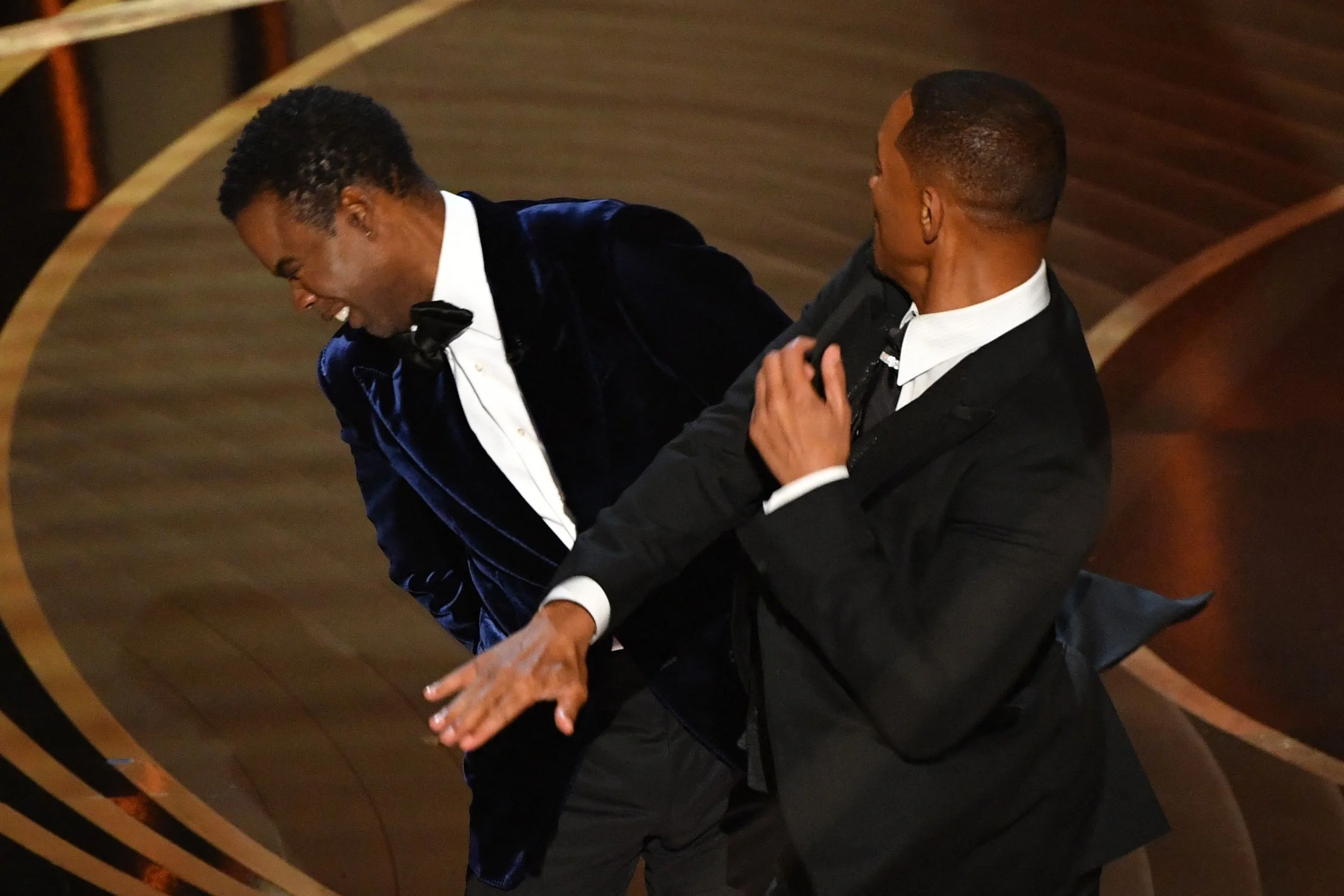And the Oscar for Toxic Masculinity goes to...
The 94th Academy Awards were held last night. Will Smith won the Oscar for Best Actor soon after he slapped Chris Rock on live television for telling a dumb joke at Jada Pinkett’s expense. It was so shocking a moment that the broadcast itself freaked out for a second, freezing and stuttering in disbelief and refusing to make a sound for a good ten seconds while F bombs were being lobbed in the Dolby Theater. I myself assumed it must have been a set-up because it was the most ridiculous thing I have ever seen at the Oscars, and I’ve watched every Oscars telecast since the mid-80s (and I have, of course, seen videos of older Oscar shenanigans, but a naked guy is less ridiculous than Best Actor slapping a Presenter across the face).
It’s likely Rock didn’t even write the joke, so he got slapped for reading someone else’s joke off a teleprompter. Pinkett’s alopecia and the fact the joke was about her being bald (it was a G.I. Jane reference, a super dumb, really old reference) does nothing to explain Smith’s actions. This was more like Big Baby Style.
I’m glad Jane Campion won an Oscar for Best Director—she lost to Spielberg in 1994 and beat him last night. I was glad to see Chastain win, though I wanted Stewart, of course. My favorite win was for Questlove, who seems headed for an EGOT after he concocts some kind of theatrical experience for The Roots. And Billie Eilish and Finneas won!
The rest of the awards were boring as usual. Amy Schumer and Wanda Sykes landed a few jokes—by landed, I mean no one slapped them, I guess?
CODA won Best Picture, which is at least not an embarrassment, like some Best Picture winners have been. It’s not a bad movie, it’s just a very simplistic movie that is not very memorable. It has good performances; it was nice that the deaf actor won. It was not the best movie on the list, or the second best. Or the third or fourth best. But that’s not unusual.
What was unusual about the win was that it was the first for a movie distributed by a streaming service. CODA did evidently have a small theatrical release, but presumably Apple paid far more than the already high prices it paid for the movie at Sundance ($25M) to get this Oscar in marketing costs. The streamer win was supposed to be one of the big headlines coming out of the show, but that was before Will Smith smacked Chris Rock and screamed at him to “Keep my wife’s name out of your fucking mouth” a couple times.
Is that preempted streamer headline notable? In this case, Apple behaved pretty much like a traditional distributor, purchasing the distro rights for and a Sundance hit and then putting it out in the fullness of time. Apple did not originate or pay for the production. With as much money as Netflix, Amazon and Apple have, since so much of this is a money game, it was inevitable that one of these distributors would put out a Best Picture.
That the win happened during an already chaotic, controversial and ultimately catastrophic Academy Awards ceremony might, in future assessments, be seen as a harbinger—while Hollywood slept, stumbled, or fought, Tech pulled their industry right out from under them. But that’s already a tired take, with little nuance. Hollywood as always been technology-dependent and, you might say, now more than ever. If the biggest question in Hollywood is really about whether we’re going to continue to have movie theaters, it feels like the industry is already conceding defeat. Not because theaters are going away any time soon but because they just feels small-minded.
A bigger question at this moment would be What are the movies, anyway? They’re not a medium constrained to just one kind of building. I’ve been watching movies at home since I was a small child. Now I watch them on a TV that is far bigger and with higher resolution than I could have conceived of as a child. I have always watched movies alone—in theaters and at home—so I don’t need the communal experience—sometimes I even prefer not to have it. There’s this idea that television and cinema are different forms, but they have more in common all the time. There are types of moving image art that appear only on TV, like cooking shows, for example, just like there are other types that appear primarily on YouTube.
But when it comes to narrative fiction, the only difference between a movie and TV show at this point is length. There are years of best practices that characterize some aspects of each medium—a multi-camera sitcom isn’t shot the way a comedy film would be, exactly, but techniques are easily changed. What we should wonder about is whether the distinction between film and television is still viable. How do we characterize the difference? What makes a film a film and a TV show TV?
